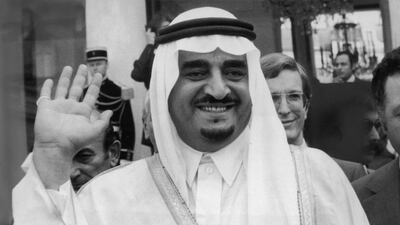Saudi Arabia's Vision 2030 is helping the country address the challenging mission of freeing itself of its dependency on oil revenues. This ambition has been a repetitive theme of the kingdom's development plans since 1975.
Those who doubt Saudi Arabia’s capabilities to deliver something quite so substantial by 2030 should not forget what happened more than 40 years ago.
In December 1974, my family assets were a small house in the coastal city of Jeddah and a barely functioning Toyota sedan. By the mid-1980s, my father bought a brand new GMC Suburban shortly after finishing two beautiful buildings beside our house, which was given to us free of charge, as he was a member of the armed forces.
It was not only my family who went through this class transition, but also a generation of Saudi families who became today’s middle class.
I maintain that in 1975 the government had a vision to establish the modern state of Saudi Arabia, which required massive infrastructure projects and the empowerment of the Saudi people.
The state successfully delivered a vision of cement and education in just a decade.
Behind the 1975 vision was the dynamic, progressive Crown Prince Fahd bin Abdulaziz. He empowered a cadre of western-educated ambitious young men, who radically reformed the state bureaucracy.
In some ways he was an historical precursor to Mohammed bin Salman, today's deputy crown prince. Indeed, a new wave of young, business-orientated officials has been empowered over the past couple of years.
In 1975, Prince Fahd formed six new ministries – electricity and industry, housing, higher education, telecommunication, municipality and rural affairs, and planning – and appointed talented technocrats, such as Ghazi Al Gosaibi, Saud Al Faisal and others to lead government entities. The number of civil servants rocketed from 97,000 in the early 1970s to 350,000 by the mid-1980s. During this golden decade of prosperity, the population doubled to 14 million.
The three dimensions of development – housing, industry, and agriculture – were represented by massive funds addressing these fronts.
By the mid-1980s, the state had successfully built more than 100,000 and had generously allocated interest-free loans for thousands of citizens across the country.
In 1978, The New York Times published a story about King Saud University’s continuing plan to become the Middle East’s MIT and to house a library comparable to Stanford University's impressive facilities. Women’s education was another focus. In the early 1970s, literacy rates among women stood at just 2 per cent before jumping to 50 per cent during the following few years.
These notable years were full of almost unthinkable top-down initiatives: from building a solar farm north of Riyadh and an eye-opening plan to pull icebergs from Antarctica to Saudi coasts (an idea that has recently been mooted again in this region), to progressively exploring the “going nuclear” option.
In 1976, Saudi Arabia Basic Industries Corporation was born as groups of engineers and business graduates, and convinced Prince Fahd to build two industrial cities in the middle of the desert. Youth are a central feature of Saudi Vision 2030, just as they were in 1975.
Prince Fahd appointed his eldest son, Prince Faisal, to head the newly formed General Presidency of Youth Welfare with a budget that increased from $38 million in 1975 to $800 million in 1983.
That resulted in a network of state-of-the-art stadiums in almost every major city, not to mention winning the Asia Football Cup in 1984 and 1988.
Football fans in the kingdom will hope that Vision 2030 stirs similar successes this time around.
Saeed Alwahabi is an analyst and journalist in Abu Dhabi

